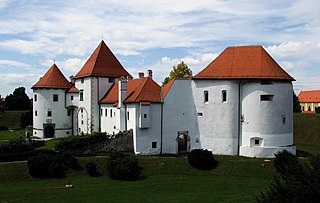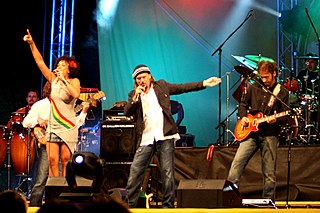
Vukovar is a city in eastern Croatia. It contains Croatia's largest river port, located at the confluence of the Vuka and the Danube. Vukovar is the seat of Vukovar-Syrmia County. The city's registered population was 26,468 in the 2011 census, with a total of 27,683 in the municipality.
The music of Croatia, like the divisions of the country itself, has two major influences: Central European, present in central and northern parts of the country including Slavonia, and Mediterranean, present in coastal regions of Dalmatia and Istria.

Karlovac is a city and municipality in central Croatia. According to the National census held in 2011 population of the settlement of Karlovac was 55,705.

Varaždin is a city in Northern Croatia, 81 km (50 mi) north of Zagreb. The total population is 46,946, with 38,839 on 34.22 km2 (13.21 sq mi) of the city settlement itself (2011). The centre of Varaždin County is located near the Drava River, at 46.312°N 16.361°E. It is mainly known for its baroque buildings, music, textile, food and IT industry.

Klapa music is a form of traditional a cappella singing in Dalmatia, Croatia. The word klapa translates as "a group of friends" and traces its roots to littoral church singing. The motifs in general celebrate love, wine (grapes), country (homeland) and sea. Main elements of the music are harmony and melody, with rhythm very rarely being very important. In 2012 klapa was inscribed in UNESCO Intangible Cultural Heritage of Humanity.

Vodice is a town in the Šibenik-Knin County, Croatia. It borders the Adriatic Sea and has a population of 8,875.

Tereza Ana Kesovija is an internationally acclaimed Croatian recording artist. She is one of the most recognizable figures on the Balkan music scene, and is renowned for her wide vocal range and operatic style. She also had a successful career in France. She has held many concerts around the world, being one of the few Yugoslav musicians to have sold out shows in The Royal Albert Hall, L'Olympia and Carnegie Hall.

Anthony "Tony" Cetinski is a Croatian pop singer. Today, he is one of the most popular male singers in Croatia and countries of the former Yugoslavia.

Arsenije "Arsen" Dedić was a Croatian singer-songwriter. Dedić wrote and performed chansons as well as film music. He was also an award-winning poet and was one of the best-selling poets of former Yugoslavia.
Zdenko Runjić was a Croatian songwriter based in Split. In his long career, he established himself as one of the most prolific and most popular songwriters of the former Yugoslavia and Croatia.
Ivan Mikulić is a Herzegovinian-Croatian singer, best known outside his country for having represented Croatia in the Eurovision Song Contest 2004, singing "You Are The Only One". Mikulić has a large vocal range, which wasn't demonstrated in his performance, and he has incorporated traditional Croatian and Herzegovinian elements in his music such as the Ganga.

Pula Film Festival is an annual Croatian film festival, established in 1954. It is held in a Roman amphitheater known as the Pula Arena. Pula Film Festival is the oldest Croatian film festival and is usually held in the summer, in July or August.
The Croatian music festivals are a series of music festivals which showcase the top Croatian musical acts, in both traditional and contemporary music. They usually involve live performances as well as awards given by festival jurors as well as from the fans. The majority of the festivals release a compilation of the songs entered.

National and University Library in Zagreb (NSK) is the national library of Croatia and central library of the University of Zagreb.

Croatian popular music is the popular music of Croatia.
The Dubrovnik Summer Festival (Croatian: Dubrovačke ljetne igre; [dubrɔʋatʃkɛ ʎɛtnɛ iɡrɛ] is an annually-held summer festival instituted in 1950 in Dubrovnik, Croatia. It is held every year between 10 July and 25 August.
Music Biennale Zagreb is an international festival of contemporary music in Zagreb, Croatia, organized by the Croatian Composers' Society. The Biennale, founded by Milko Kelemen and held every spring of the odd years since 1961, has become one of the most important festivals of contemporary music in Europe.
Croatian dance traditionally refers to a series of folk-dances, the most common being the kolo.
Miljenko Prohaska was a Croatian composer, music arranger and orchestra conductor.













